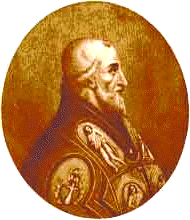 St. Leo IX, the first of a number of truly great reform popes, was born at
Egisheim in Alsace, June 21, 1002, of a family connected with the imperial
house. Bruno became a cleric quite young, and already in 1017 was a canon at
Toul. When his father's cousin Conrad came to the throne, Bruno was sent to
serve in the royal chapel. At court as at home he distinguished himself by his
goodness. In 1026 Bruno led his bishop's feudal levy into Italy to support
Conrad's demonstration. The next year Bruno became bishop of Toul. He worked
hard to reform his diocese.
St. Leo IX, the first of a number of truly great reform popes, was born at
Egisheim in Alsace, June 21, 1002, of a family connected with the imperial
house. Bruno became a cleric quite young, and already in 1017 was a canon at
Toul. When his father's cousin Conrad came to the throne, Bruno was sent to
serve in the royal chapel. At court as at home he distinguished himself by his
goodness. In 1026 Bruno led his bishop's feudal levy into Italy to support
Conrad's demonstration. The next year Bruno became bishop of Toul. He worked
hard to reform his diocese.
After the death of Damasus II, Henry III named his cousin Bruno to the papacy.
Bruno showed a spirit of independence by refusing to accept until the Roman
clergy elected him. Already popular with the Romans, Bruno was enthusiastically
received, and on February 12, 1049, he was enthroned as Leo IX. The great
objective of the new Pope was reform. He held a Council at Rome in April, 1049,
which once more legislated against simony and clerical marriage. Reform decrees
already existed, but this time something new was added--a personal determined
effort on the Pope's part to get these decrees enforced. Leo took to the road
and at Pavia in North Italy, Mainz in Germany, and Rheims in France the
energetic Pope filled the bishops with an ardent will to cooperate with the
reform.
While Leo's pontificate saw a grand start toward reform in the West, it also
witnessed the events leading to the sad Eastern Schism. Michael Caerularius, the
ambitious patriarch of Constantinople, launched an anti- Western propaganda
campaign to loosen the bonds of union. When he proceeded to close Latin churches
in Constantinople and force Latin monks to adopt the Greek rite, Leo protested.
The Emperor forced the patriarch to give in, but when Leo sent legates to
investigate, they were defied by the patriarch. The legates then on July 16,
1054, excommunicated the patriarch. The patriarch thereupon revolted from Rome,
and the sad Eastern Schism had begun. Leo died before this final break occurred.
Leo had been hearing bitter complaints about the brutal conduct of the Normans
in South Italy. He went to Germany for help, but though he got little, he
decided to lead an army against the Normans anyway. The tough Normans routed the
papal army and soon were battering at the gates of Civitella, the papal
headquarters. To avert more bloodshed, Leo surrendered himself to the enemy.
His dignity accomplished more than his army. The Normans, embarrassed at having
the Pope a prisoner, promised to become his allies! This campaign took a great
deal out of Leo. A sick man, he covered the distance back to Rome, but died
piously on April 9,1054. Among the interesting visitors received by Leo was
Shakespeare's famous Macbeth of Scotland. Leo arranged for the appointment of a
bishop for far-off Iceland.
Not only a great leader and administrator, Leo was a musician of note. He
composed music for feasts of St. Gregory and St. Columban. But more than all
these, Leo was kind, patient, humble--a true pope, a real saint.
Excerpted from "Popes
Through the Ages" by Joseph Brusher, S.J.

